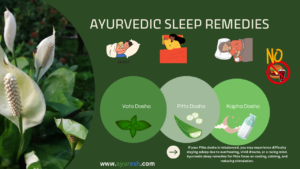Ayurvedic Stress Relief techniques revolve around the idea that stress stems from imbalances in our doshas—Vata, Pitta, and Kapha. By bringing these energies back into alignment, Ayurveda provides natural and sustainable ways to calm the mind and restore inner peace. In this blog, we will explore various Ayurvedic techniques to relieve stress, helping you achieve mental clarity and emotional balance.

Ayurvedic Stress Relief
In today’s fast-paced world, stress has become an all-too-common companion in our daily lives. From juggling work deadlines to managing family responsibilities, the modern lifestyle often leaves us feeling overwhelmed and mentally fatigued. While there are various methods to manage stress, Ayurveda offers a time-tested and holistic approach to stress relief that focuses on balancing the mind, body, and spirit.
Table of Contents
Understanding Stress from an Ayurvedic Perspective
According to Ayurveda, stress is a manifestation of an imbalance in the mind-body system, primarily caused by disturbances in the doshas. Each dosha plays a vital role in how we respond to stress:
- Vata (Air and Space): Vata types tend to feel anxious, restless, and overwhelmed when stressed. Their overactive minds can lead to sleeplessness and nervous tension.
- Pitta (Fire and Water): Pitta types experience stress through anger, frustration, and irritability. They are prone to burnout and can become overly critical of themselves and others when stressed.
- Kapha (Earth and Water): Kapha types may react to stress by becoming lethargic, withdrawn, or emotionally dependent. They tend to internalize stress, leading to feelings of heaviness and stagnation.
The key to Ayurvedic Stress Relief lies in recognizing your unique doshic constitution and adopting practices that help balance your dominant dosha during times of stress.
Ayurvedic Techniques for Stress Relief
Abhyanga (Self-Massage with Warm Oil)
One of the most calming and nourishing practices for Ayurvedic Stress Relief is Abhyanga, a self-massage with warm oil. This technique is particularly effective for balancing Vata dosha, which is often linked to anxiety and nervous tension. Abhyanga involves applying warm, herb-infused oils like sesame or coconut oil to the entire body, followed by gentle massage strokes.
The benefits of Abhyanga include:
- Grounding the body and calming the mind.
- Stimulating circulation and releasing muscle tension.
- Moisturizing and rejuvenating the skin.
For best results, perform Abhyanga daily, preferably in the morning, and follow with a warm shower or bath.
Pranayama (Breathwork for Calming the Mind)
Breath is intimately connected to the mind. When we are stressed, our breathing becomes shallow and rapid, which can further exacerbate feelings of anxiety. Pranayama, the practice of controlled breathing, is a powerful tool for Ayurvedic Stress Relief. By regulating the breath, we can calm the mind and reduce stress instantly.
Two effective pranayama techniques for stress relief are:
- Nadi Shodhana (Alternate Nostril Breathing): This balancing breath technique helps calm the nervous system and promotes mental clarity. It is especially helpful for Pitta imbalances.
- Bhramari (Bee Breathing): This technique uses a humming sound to soothe the mind, making it an ideal practice for relieving tension and promoting relaxation.
Practicing pranayama for 10-15 minutes daily can significantly reduce stress and help you regain mental balance.
Shirodhara (Oil Therapy for Deep Relaxation)
Shirodhara is one of the most luxurious and effective treatments for Ayurvedic Stress Relief. It involves gently pouring a continuous stream of warm oil onto the forehead, specifically over the “third eye” region, which is associated with intuition and inner peace. This therapy is known to calm the nervous system, relieve mental fatigue, and promote deep relaxation.
Shirodhara is commonly used to treat stress-related conditions such as insomnia, anxiety, and depression. The therapy is often performed at Ayurvedic wellness centers, but you can also recreate a simplified version at home by warming oil and gently massaging it into your scalp before bed.
Herbal Adaptogens for Stress Management
Ayurveda relies heavily on the use of herbs and adaptogens to support mental and emotional well-being. Some of the most potent herbs for Ayurvedic Stress Relief include:
- Ashwagandha: Known as the “king of Ayurvedic herbs,” ashwagandha helps reduce cortisol levels, the hormone responsible for stress. It promotes relaxation and improves resilience to stress.
- Brahmi: This brain tonic is excellent for calming the mind and improving mental clarity. It is especially effective for Vata and Pitta imbalances.
- Tulsi (Holy Basil): Tulsi has adaptogenic properties, meaning it helps the body adapt to stress and maintain balance. It also boosts immunity and protects against oxidative stress.
You can incorporate these herbs into your routine through herbal teas, supplements, or powders mixed into smoothies or warm milk.
Meditation and Mindfulness
Meditation is one of the cornerstone practices for Ayurvedic Stress Relief. It allows you to quiet the mind, observe your thoughts without judgment, and cultivate a sense of inner peace. Ayurveda recommends daily meditation as a way to manage stress and promote emotional balance.
- Vata types benefit from grounding, guided meditations that focus on calming the nervous system.
- Pitta types can practice mindfulness meditation to release anger and frustration.
- Kapha types may find energizing meditations helpful to combat feelings of lethargy and inertia.
Even 10 minutes of daily meditation can help reset your mind, making it easier to manage stressful situations with calm and clarity.
Balancing the Doshas Through Diet
In Ayurveda, diet plays a crucial role in balancing the doshas and reducing stress. Eating foods that are suitable for your dosha can help stabilize your mood, improve digestion, and enhance mental clarity. For Ayurvedic Stress Relief, focus on the following dietary tips:
- Vata: Opt for warm, cooked, and nourishing foods like soups, stews, and herbal teas. Avoid cold or raw foods, as they can aggravate anxiety.
- Pitta: Choose cooling, hydrating foods such as fresh fruits, vegetables, and coconut water. Avoid spicy or acidic foods that can trigger anger and irritability.
- Kapha: Incorporate light, warm, and mildly spiced foods into your diet. Avoid heavy, oily, and overly sweet foods, as they can lead to sluggishness.
By aligning your diet with your doshic constitution, you can better manage stress and maintain mental equilibrium.
Ayurvedic Sleep Practices for Stress Relief
Quality sleep is essential for effective Ayurvedic Stress Relief. Lack of sleep can exacerbate stress, leading to irritability, mental fog, and reduced emotional resilience. Ayurveda offers several sleep practices to ensure restful and restorative sleep:
- Create a calming bedtime routine: Wind down with a warm bath, gentle self-massage, and herbal teas like chamomile or Brahmi.
- Use calming essential oils: Diffusing lavender or sandalwood essential oils in your bedroom can help create a serene environment.
Practice Yoga Nidra: Yoga Nidra, or yogic sleep, is a powerful meditative practice that guides you into a state of deep relaxation. This practice is particularly beneficial for relieving mental stress and promoting restful sleep.
Conclusion
Ayurvedic Stress Relief is a holistic and natural approach to calming the mind and balancing the body. By incorporating Ayurvedic techniques such as Abhyanga, Pranayama, herbal remedies, and mindful eating into your daily routine, you can effectively manage stress and promote mental clarity. Whether you’re dealing with acute stress or looking to cultivate long-term peace of mind, Ayurveda offers a comprehensive toolkit to support your journey toward emotional and physical well-being.
Ayurveda can indeed help with long-term stress and anxiety by addressing the root causes and promoting balance in the body and mind. Unlike conventional treatments that may focus on immediate symptom relief, Ayurveda views stress and anxiety as imbalances in the doshas (Vata, Pitta, and Kapha). It offers personalized, holistic approaches to restore harmony through lifestyle changes, diet, herbal remedies, and stress-relieving practices like yoga, meditation, and Pranayama (breathwork).
For long-term stress, Ayurveda emphasizes balancing the Vata dosha, which governs the nervous system. Techniques such as regular self-massage (Abhyanga) with warm oils, herbal treatments like ashwagandha and Brahmi (adaptogens that reduce cortisol and improve resilience), and incorporating grounding, nourishing foods can calm the nervous system.
Additionally, Ayurveda integrates mental and emotional practices like meditation and mindfulness to develop resilience and emotional balance. By focusing on prevention and long-term well-being, Ayurveda helps to manage anxiety and stress sustainably, reducing their recurrence.
FAQs
- How long does it take to see the benefits of Ayurvedic stress relief techniques?
- Ayurvedic practices are holistic, so you may begin to feel some relief within days, but long-term benefits are seen with consistent practice.
- Can I use Ayurvedic herbs for stress without consulting a practitioner?
- While Ayurvedic herbs like ashwagandha and tulsi are generally safe, it’s always best to consult with an Ayurvedic practitioner, especially if you have underlying health conditions.
- Is Abhyanga safe for all doshas?
- Yes, Abhyanga is beneficial for all doshas, though the type of oil used may vary depending on your dosha. For example, sesame oil is good for Vata, while coconut oil is cooling for Pitta.
- How often should I practice Pranayama for stress relief?
- Ideally, Pranayama should be practiced daily for 10-15 minutes, but even short sessions during moments of stress can be helpful.
- What’s the best Ayurvedic tea for stress relief?
- Ashwagandha, tulsi, and Brahmi teas are excellent for calming the mind and relieving stress.
- Can Ayurveda help with long-term stress and anxiety?
- Yes, Ayurveda offers sustainable techniques and remedies that address the root cause of stress and help manage long-term mental health.





